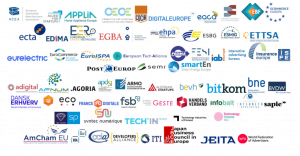Strong industry concern on the ePrivacy Regulation – Video Games Europe signs joint letter

Brussels, 28 November 2018 - Ahead of the Transport, Telecommunications and Energy Council meeting of 4 December, businesses from across all sectors of the European economy would like to reiterate their concern about the proposal for an ePrivacy Regulation. Despite ongoing negotiations in the Council, the text remains far from addressing the many substantive issues that have been raised since the proposal was first put forward. We therefore urge Member States to signal clearly that negotiations with the European Parliament should not be rushed on the basis of a flawed text, which would have profound repercussions for the European economy.
There have been numerous calls in recent months exhorting the Council to start trialogues as soon as possible. We respectfully submit, however, that these calls have consistently failed to articulate the link with existing, comprehensive protections under the General Data Protection Regulation (GDPR) and why these should be complemented by inflexible ePrivacy rules. While strong levels of privacy protection are essential, the coherence and quality of the proposed Regulation should not be sacrificed.
We stress once again that the expanded scope of the ePrivacy proposal would create a large overlap with the GDPR, effectively replacing large portions of the GDPR for a vast majority of data processing activities. This goes well beyond the traditional telecoms or online sectors and would apply broadly to all products and services in Europe’s connected society. Europe’s ability to innovate in artificial intelligence, energy transition, manufacturing, cooperative intelligent transport systems, medical technology and more would be subject to static, one-size-fits-all rules that are unreasonable for very different use cases.
At a time when practical application of the GDPR has just commenced, companies from different sectors have received no clarity as to how ePrivacy would apply to existing and emerging technologies and services. Proceeding on the basis of an incomplete understanding of the proposal’s impact will only damage Europe’s digital transformation, from both an economic and societal standpoint.
Closer consideration of the legal bases for both electronic communications data and terminal equipment data and alignment with those available under the GDPR are needed in order to achieve a more robust, balanced and future-proof ePrivacy text that aligns to Europe’s global competitiveness objectives. We urge Member States to carefully examine and reconsider the proposal with such objectives in mind.
The following associations have signed this letter:
- ACEA – European Automobile Manufacturers’ Association
- Adigital – Asociación Española de la Economía Digital
- AFNUM – Alliance Française des Industries du Numérique
- AGORIA
- Allied for Startups
- AmCham EU
- APPLiA – Home Appliance Europe
- APDSI – Associação para a Promoção e Desenvolvimento da Sociedade da Informação
- ARMO – Asociatia Romana a Magazinelor Online
- AustrianStartups
- bevh – Der E-Commerce Verband
- Bitkom
- BNE – Bundesverband Neue Energiewirtschaft
- BSA | The Software Alliance
- BVDW – Bundesverband Digitale Wirtschaft
- CCIA – Computer and Communications Industry Association
- CECE – Committee for European Construction Equipment
- COCIR – European Coordination Committee of the Radiological, Electromedical and Healthcare IT Industry
- Confederation of Industry of the Czech Republic
- Dansk Erhverv – Danish Chamber of Commerce
- Developers Alliance
- DIGITALEUROPE
- DINL – Stichting Digitale Infrastructuur Nederland
- EACA – European Association of Communications Agencies
- EACB – European Association of Co-operative Banks
- EBF – European Banking Federation
- eco – Verband der Internetwirtschaft
- Ecommerce Europe
- ECTA – European Competitive Telecommunications Association
- EDiMA
- EER – European Energy Retailers
- EGBA – European Gaming and Betting Association
- EHHA – European Holiday Home Association
- EHPA – European Heat Pump Association
- ESBG – European Savings and Retail Banking Group
- ESMIG – The European voice of the smart energy solutions providers
- ETTSA – European Technology and Travel Services Association
- Eurelectric – Union of the Electricity Industry
- EuroCommerce
- EuroISPA
- European Tech Alliance
- FEDMA – Federation of European Direct and Interactive Marketing
- FESI – Federation of the European Sporting Goods Industry
- France Digitale
- FSB – Federation of Small Businesses
- GESTE – Les éditeurs de contenus et services en ligne
- Handelsverband Österreich
- IAB Europe
- INFOBALT
- Insurance Europe
- Video Games Europe – Interactive Software Federation of Europe
- ITI – Information Technology Industry Council
- Japan Business Council in Europe
- JEITA – Japan Electronics and Information Technology Industries Association
- Latvijas Interneta Asociācija
- News Media Europe
- PostEurop
- SAPIE – Slovak Alliance for Innovation Economy
- SEMI
- smartEn – Smart Energy Europe
- Syntec Numérique
- TECH IN France
- Technology Industries of Finland
- Technology Ireland
- techUK
- WFA – World Federation of Advertisers
About
Video Games Europe serves Europe’s video games industry by representing the interests of Europe’s – and the world’s – most successful, creative and innovative game publishers and developers and ensuring that the value of games is widely understood and that the immersive and engaging experiences they deliver are enjoyed by all. Video Games Europe membership comprises 13 of the largest video game companies and trade associations from 18 countries throughout Europe covering hundreds of other companies. The video games industry is a leading contributor to the Digital Single Market’s agenda of creating growth and jobs in the digital economy. It is the fastest growing sector of the European content industry with a €20 billion revenue in Europe in 2017 and a 18% growth year on year on key markets in Europe. Half of the European population play video games – close to 250 million people.

